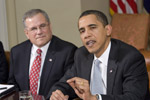
A long-awaited meeting on Sudan policy between President Obama’s cabinet officials is slated to take place on Tuesday, Sept. 29. This so-called principals’ meeting will include Secretary of State Hillary Clinton, U.S. Ambassador to the United Nations Susan Rice, Defense Secretary Robert Gates, and other members of the president’s national security team. If the principals agree and send a recommendation to the president for his approval, the much ballyhooed policy review will be nearly complete. But if there is strong disagreement on the policy, we could be headed for another round of debate.
The policy review has been over six months in the making and marked by moments of controversy, as reports emerged of infighting between administration officials and as the top U.S. diplomat working on Sudan seemed to make headlines (and not usually positive ones) at almost every turn. Ultimately, the discussion tomorrow will center on the balance of carrots and sticks that the administration will use to press for change in Sudan and how the U.S. will deal with the likelihood of an independent southern Sudan.
As this process has dragged on, many Sudan-watchers and advocacy groups, including the Enough Project, have been disconcerted by the direction that U.S. policy seems headed under Presidential Envoy General Scott Gration. As Enough’s John Norris noted last week:
Again and again in public statements the special envoy seems to gravitate toward highlighting his preference for incentives over pressures, and every single time there seems to be a follow-up statement insisting that the envoy is relying equally on the two. It is hard not to discern some patterns here.
Despite the ruling National Congress Party’s 20-year history of orchestrating violence in various parts of the country, its failure to live up to commitments made in several peace agreements, and an outstanding arrest warrant for Sudanese President Bashir on charges of war crimes and crimes against humanity, the U.S. seems to believe that it can achieve peace in Sudan by offering incentives to the regime and shelving, at least for now, additional pressures.
Disappointment about the Obama administration’s direction on Sudan has been perhaps more pronounced because of the high expectations set by the president, Vice President Biden, and Secretary Clinton when they were senators. All three repeatedly stressed the need for tougher measures to alter the calculations of the Sudanese government. As President Obama works with allies to isolate Iran for its drive to attain a nuclear weapon, the administration is unwilling to engage in the same type of tough diplomacy needed to isolate a regime it has repeatedly accused of genocide.
With violence escalating in Darfur and the South, looming national elections that could lend legitimacy to an accused war criminal, and the prospect of a new and potentially failed state in southern Sudan, now is not the time to let up the pressure on all sides to adhere to their commitments and act in the best interests of the people of Sudan.
Photo: President Obama and Sudan Special Envoy Maj. General Scott Gration (AP/Evan Vucci)

